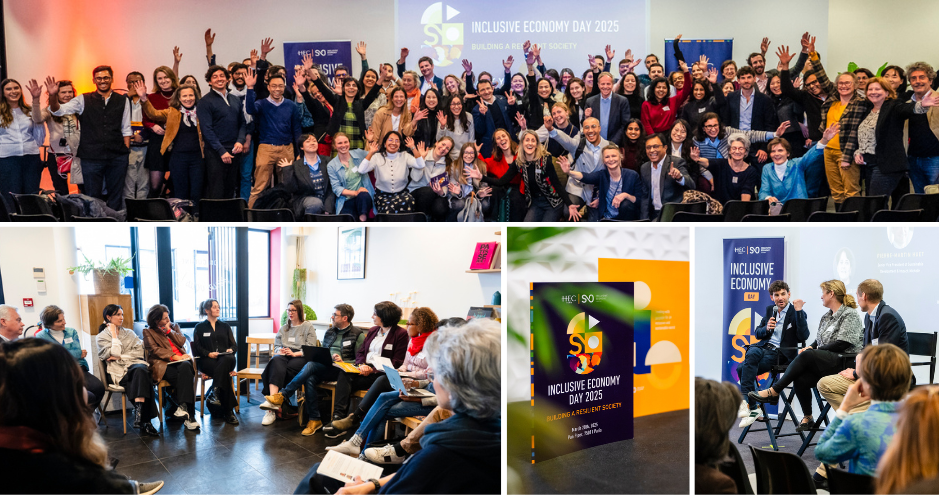Academic and Business Leaders Unite at HEC Paris to Address Global Inclusion Challenges
The S&O Inclusive Economy Center at HEC Paris recently hosted its third Inclusive Economy Day, bringing together over 180 participants from academia, corporations, entrepreneurship, and NGOs. Despite taking place in a challenging international context, the event reinforced the center's commitment to addressing crucial societal issues through reasoned thinking and innovative approaches.

Set against a backdrop of global uncertainty, the day-long event emphasized the importance of resilience in pursuing social and economic inclusion. Participants engaged in high-level debates and collaborative brainstorming sessions, exploring pathways to systemic change through thoughtful analysis and cross-sector cooperation.
The event culminated with a special address by Michael Posner, Professor and Director of the Center For Business and Human Rights at NYU Stern School of Business and Former US Assistant Secretary of State for Democracy, Human Rights, and Labor, who highlighted the progress made in human rights while calling for new collaborative approaches in a world lacking global governance.
Declining Social Connections: Impact on Economic Life
The first session explored the paradoxical decline in social connections despite their critical importance to economic life. Researchers presented findings on how social connectivity influences economic outcomes and discussed potential interventions to strengthen social bonds in increasingly fragmented societies.
Presentations were delivered by renowned researchers including Aparajita Agarwal (Wharton School), Yann Algan (HEC Paris) with the practictionner’s perspective of Charles-Edouard Vincent (Founder of Emmaüs Défi)
Governing Collective Action as a Vector for Systemic Change
This session examined how various types of organizations can coordinate effectively to address complex social and environmental challenges. Speakers highlighted the unique strengths that different organizational forms bring to collaborative efforts and identified strategies for fostering partnerships that drive meaningful, systemic change. The discussion emphasized practical approaches to overcoming barriers to collective action in pursuit of common goals.
Presentations were delivered by renowned researchers including Aline Gatignon (The Wharton School), Ilze Kivleniece (INSEAD) with the practictionner’s perspective of Gilles Vermot-Desroches (Schneider Electric)
Social Product Labeling: Opening a New Era of Possibility
Speakers explored whether labeling products with measures of social impact—such as inequality metrics and human rights credentials—could serve as an effective lever for promoting sustainable business practices. The session combined current research insights with practical implementation strategies, suggesting how transparency around social impacts might influence both consumer behavior and corporate decision-making.
Presentations were delivered by renowned researchers including Patricia Crifo (École Polytechnique), Brian Hill (HEC Paris) with the practictionner’s perspective of Pierre-Martin Huet (Michelin).
Collaborative Pathways Forward
The event featured enriching brainstorming sessions where participants tackled key organizational challenges including employee engagement with sustainability issues, entrepreneurship and social vulnerabilities, human rights in global supply chains, regional inequality, and mental health matters.
In his closing address, Michael Posner offered valuable takeaways for different stakeholders: businesses must acknowledge their business models, measure what truly matters beyond economic performance, collaborate on industry standards, and integrate double materiality approaches; governments should push for transparency while avoiding regulatory overlap; and NGOs need to balance criticism with constructive engagement to become part of the solution.
The S&O Inclusive Economy Day, sponsored by Schneider Electric, concluded with a sense of renewed purpose despite the difficult political climate, reinforcing the crucial role of academic centers, businesses, and civil society in moving the world toward greater social and economic inclusion.
More about the Inclusive Economy Day
More about the Inclusive Economy CenterThe HEC Paris Inclusive Economy Center is dedicated to providing new ideas and insights to help businesses contribute to building an inclusive society with a positive and responsible impact. In a changing world facing a variety of multi-faceted crises, the Center recognizes the continued importance of social cohesion and justice for navigating these crises successfully and robustly. Part of the HEC Sustainability & Organizations Institute, and a pioneer in this space at HEC Paris since 2008, the Center federates expertise on a range of topics, with a focus on two challenges that are particularly relevant today: designing organizational eco-systems that resiliently support the social good, and understanding and enhancing the social cohesion essential for collective and individual well-being. Through its research, teaching, and engagement with businesses and policymakers, it aims to drive meaningful change, equipping organizations with the tools to lead in an increasingly complex world. |